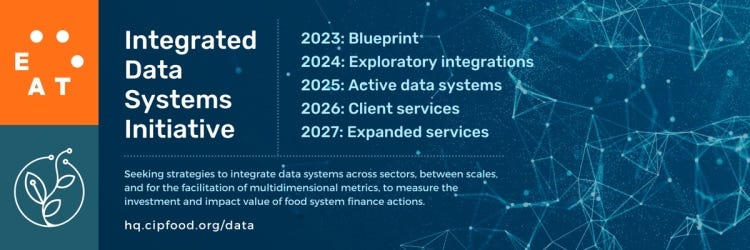Five-year sprint to transform food-related finance data
The Integrated Data Systems Initiative is a Good Food Finance Network effort to convert dialogues around data needs and emerging innovations into real-world solutions that track food systems finance impacts across multiple dimensions.
Cascading crises
Healthy, sustainable food systems will require financial support. Mainstream financial activity will need to move away from extraction-oriented production methods to those that restore and sustain nature, operate within planetary boundaries, and significantly reduce the incidence of diet-related non-communicable diseases.
The cost of failing to make this transition will be measured in trillions of dollars wasted—both good money sent after bad and vast opportunities lost—but it will also be measured in destabilization dynamics. Without reliable affordable food supplies, without adequate nutrition and metabolic health to reduce Anthropocene pandemic risk, and without fiscal resources to respond to intensifying and more frequent shocks, nation states will fail.
We know the risk is widespread and worsening. In 2022, 45 nations experienced near famine conditions for an average of more than 1 million people each. Interacting and compounding stresses are just beginning to generate this dynamic; without rapid, universal transition to climate-smart practices, this situation will get worse.
Data for better decision-making
In May, the Good Food Finance Network launched the Integrated Data Systems Initiative, as a 5-year innovation sprint linked to AIM for Climate Summit. The goal is to transform the way data systems inform financial decision-making—across the public, private, and multilateral sectors.
The five-year sprint is roughly outlined as follows:
2023 – Development of a Blueprint for Good Food Finance Data Systems Integration
2024 – First exploratory integrations, including technologies, platforms, thematic areas, and diverse performance indicators
2025 – Business model development linked to exploratory integrations + further consolidated integrations
2026 – Initial delivery of services, including pro-bono offerings for underserved and marginal communities and value chain actors
2027 – Commercial data services linked to financial decision-making and to serve public agencies tracking policy and investment performance
Initial consultations in 2022 and 2023 have made clear the IDSI will need to draw on:
Existing sustainability metrics;
Emerging metrics for multidimensional performance—integrating nutrition, health, climate, biodiversity, water, and ocean impacts, as well as finance and macroeconomic drivers, like consumer food prices;
Vulnerability and systemic risk—including major shocks like COVID-19 and the stability of everyday services like food, energy, infrastructure, and banking;
Accounting standards, including new emerging standards that consider non-financial returns;
Conventional financial system data flows and decision insights;
Evolving regulatory standards in all of the above related areas.
During the Data Systems Dialogue convened as part of the Good Food Finance Week in late April, participants noted the need to:
Align new data outputs with existing practices;
Provide insights that can reliably inform efforts to shift and realign subsidies;
Support mainstreaming by connecting complex interactions into simple, readable, and directional indicators;
Consider how data systems integration can support financial innovation, including multidimensional sustainability-linked bonds;
Support payments for climate and nature services, by producers and throughout value chains;
Leverage policy to incentivize updated mainstream investment strategies.
The IDSI is a response to the intensifying global need for more fine-tuned, detailed, and multidimensional data to drive better decision-making. It will harness resources from partner institutions and participating jurisdictions to design, test, and consolidate the needed technical solutions for mainstreaming of integrated good food finance data systems.

From the outset, this process of collaborative innovation will consider strategies for keeping activities rooted in lived experience, relevant to communities and small-scale actors, and to the challenge of matching large-scale finance flows to key points of leverage, including unbanked smallholders.
Real-world effects of data systems integration
Integrated data systems clearly have a role to play in supporting the delivery of ever-wider flows of capital into regenerative and agroecological production and land stewardship practices. Producers, and those that provide them financial support, need to see evidence of climate and nature benefits and to link those benefits to market demand for nutritious food.
Good food finance is needed across value chains—not just for producers or retailers. Integrated data systems can provide the multidimensional metrics required to allow actors with disparate needs and capabilities to align their efforts to advance the sustainable production of healthy food that is good for nature, climate, and people.
Consumer choice is vital. We cannot get to a healthy, sustainable food economy if most people don’t have access to food choices aligned with health and sustainability goals. Consumer choice at the scale required will require affordability: better choices becoming mainstream and affordable for everyone, every day, in all geographical and socio-economic contexts.
An integrated and holistic approach to value creation means smart food system investments can generate measurable returns on climate, biodiversity, nutrition, health, and overall resilience. Those non-financial returns will result in major savings to public spending and in terms of reduced opportunity costs from macroeconomic inefficiencies.
Without the above savings from an integrated and holistic approach to sustainable human development, a majority of nations may find themselves unable to achieve reliable fiscal stability by mid-century. Integrated data systems are needed to support national investment in non-financial returns, so the IDSI will emphasize metrics and data services that reveal non-financial returns and provide for resilience-building fiscal policy, as well as vulnerability-sensitive debt and budget management.
Setting the Good Food Finance Agenda
The Integrated Data Systems Initiative has a core aim: to deliver robust, reliable, evolving, and evidence-based multidimensional metrics to measure real-world progress toward sustainable food systems transformation. The Co-Investment Platform for Food Systems Transformation will leverage this body of evidence to support the mobilization and mainstreaming of good food finance tools and strategies.


